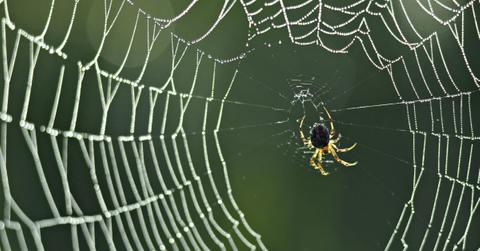Could Spiders' Web-Making Skills Lead to Cure for Alzheimer's and Parkinson's Diseases?

Scientists believe replicating the way spiders make silk could lead to the cure of Alzheimer's disease.
Jan. 13 2024, Published 9:02 a.m. ET
Scientists are continually exploring innovative approaches to address and potentially cure Alzheimer's disease, and an unexpected source of inspiration has emerged: spider webs.
Researchers investigating the silk-spinning ability of spiders stumbled upon a revelation that mimicking this process could hold therapeutic potential for diseases like Alzheimer's and Parkinson's, according to The Conversation.
At the outset of their experiments, scientists hypothesized that understanding and replicating the spider silk-spinning process might lead to the production of artificial spider silk with diverse medical applications.
For instance, artificial silk could assist in the regeneration of nerves connecting the brain and limbs, as well as facilitate the targeted delivery of drug molecules to specific cells, according to an experiment conducted by Karolinska Institutet, The Conversation reported.
Spider silk is composed of proteins known as spidroins, which are stored within the spider's abdomen. While various types of spidroins produce different silk types, spiders store them in a liquid state, resembling oil droplets.
One critical question addressed by scientists was how spiders transform these droplets into silk. Surprisingly, insights into the spider's silk-making process were determined from studies on Alzheimer's and Parkinson's diseases.
In these diseases, proteins like alpha-synuclein and tau assemble into tiny, oil-like droplets in human cells. Tau, responsible for stabilizing the internal skeleton of nerve cells in the human brain, undergoes abnormal changes in Alzheimer's, entangling with normal tau proteins.
A similar process occurs with alpha-synuclein in Parkinson's. When these proteins become entangled and persist in that state, they become toxic to human cells.
- What Lies Beneath: NASA Scientist Believes Aliens May Have Found 'Perfect' Hiding Spot in Earth's Oceans
- Global Threat: Russia Insider Warns West of 'World War Using Nuclear Weapons' Amid Escalating Support for Ukraine
- Countdown to Disaster? Ex-NATO Official Warns Russia, Iran and China Could Wage WWIII in Just Years
Armed with this knowledge, scientists utilized a synthetic spidroin named NT2REepCT, producible by bacteria.
Observing the spidroin under a microscope revealed that it formed liquid droplets when dissolved in a phosphate buffer, a salt found in the spider's silk gland. This enabled the scientists to recreate silk-spinning conditions in the lab.
Never miss a story — sign up for the Front Page Detectives newsletter. Be on the scene the moment news breaks.
Further experimentation showed that the spidroin proteins, typically forming pairs, separated into single molecules.
By recreating a c-terminal for their project, scientists discovered that when these proteins were entangled into droplets using a phosphate buffer, they transformed into rigid fibers. The spinning of these spidroins together allowed for the rapid production of silk.
With this newfound understanding, scientists believe they may eventually employ this process to detoxify tau and alpha-synuclein in patients with Alzheimer's and Parkinson's.
Become a Front Page Detective
Sign up to receive breaking
Front Page Detectives
news and exclusive investigations.
